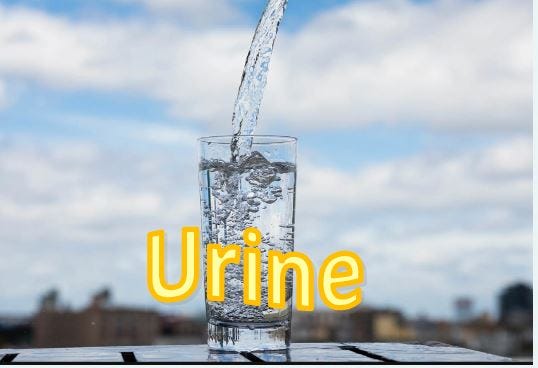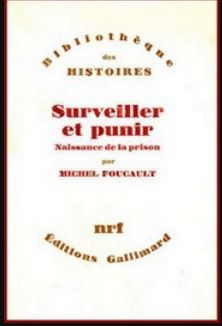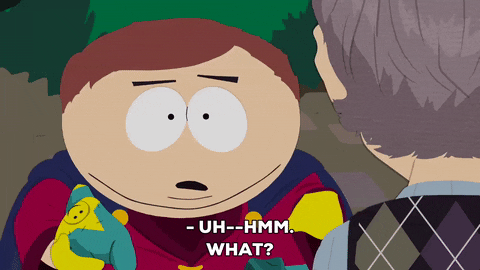Since this is part 2, it’s worth wondering what happened to part 1. I had unpublished in part because I had second thoughts, and then third thoughts about it all. Also, in spite of scrubbing out names, I still accidently left an identifying name. I unpublished and corrected. Let me again apologize to those who might have felt needlessly identified - or at least recognizable - from the text I gave. Given the circumstances, and the story I am telling, it’s almost inescapable that details will be there to reconstruct just where this is taking place, and in what department. But what is there to be worried about? I am about as exposed to mortifying scrutiny as anyone can possibly be, with a police record that tells the tale and my blog which adds the details. And yet I’ve survived in spite of all that. I’d like to do better than just survive, but things could also be worse, so I’m grateful for that. Let me add that, being at the very bottom rung of a ladder going down in a deep well, gives me not just a very different perspective, looking up from very far down below, but also a certain kind of freedom. I hear it said that people sometimes live in fear of ancient and maybe indiscreet tweets being unearthed and exposed for all the world to mock, and make it grounds to be “cancelled”. But how does that compare with a permanent police record of the kind I have? What is there left to say about me that is worse than all that? I wonder if I enjoy a special kind of “privilege” on account of having nothing left to lose?
In regards to this departmental kerfuffle, I also want to emphasize - again - that I target no one (since that seems to be a rumor). And I’m not conducting “a war” on any one (again, that seems to be a rumor). Let me be also very clear that whatever disagreements I have with how my email was interpreted (specifically as some sort of attack on the campus survey itself, which it was not), I made it very clear to the dept. chair that his role is an extremely difficult one, and that he has a very hard task of negotiating between all sorts of conflicts of interests and conflicts of visions. I’m 6000 miles away, and of tiny tiny significance. The needs of the graduate students and the faculty around him are more pressing than any of my concerns. I think that, in spite of some of my bluster, he has expertly navigated between Scylla and Charibdis.
…
But let me now address what I understand by part 2, and what I intend by that odd coupling in the subtitle, “microaggression and urine” and how I think about this issue.
Consider this lovely glass of cool and refreshing water. Anyone would drink this if asked.
Delicious. Here. Have another glass.
This is the same glass of water, but it’s labeled “urine”. Would you still drink it?
In numerous university experiments, students can easily be made to cringe at the thought of drinking from that same glass if it’s labeled “urine”. And if that water is colored with lemon juice to make it look yellow - and it is seen by students to be such, many will still be unable to bring themselves to drink from this glass of water, even though they know it’s water and lemon juice. What is my point? Labels matter. And relabeling matters. Let me explain.
The issue I have in mind is about the alleged bona fides of the term “microaggression”. I argued that it has none. Not only that, it is in fact a highly problematic relabeling of ordinary things that can have (and has had) serious and negative consequences. As I see it, what is labeled “microaggression” is often nothing more than the side-effects of free speech and debate. Nothing more and nothing less. It’s the inevitable heat produced by the friction of conversational gears doing some work, ideally with the goal of producing light. But where there is light, there is also some heat. There are ways of attenuating the friction and the heat. All well and good. It’s called courtesy and politeness. But there are other ways. You can just stop the gears altogether. No friction. No heat. And also no light and no discussion.
Here is how this is defined at the University of Edinburg, in Scotland:
"Everyday verbal, non-verbal and environmental slights, snubs or insults, whether intentional or unintentional, which communicate hostile, derogatory or negative messages to target persons based solely upon their marginalized group membership” (Sue et al 2019).
Microaggression: The University of EdinBurg
What is the upshot?
Microaggressions are the most common way racist and other forms of discrimination are expressed on a daily basis, both online and face to face, so tackling them is very important.
It’s too easy to read all that so quickly and just nod in assent without realizing that there’s an important conflation of all sorts of things here. It’s really all-encompassing: verbal but also non-verbal (like a raised eyebrow?); and also “environmental slights” (opening, or maybe not opening a door for someone?); it can be “intentional or unintentional”. How does one ever decide that anyone was in fact the “target” based on “solely upon their marginalized group membership”? Which groups are those? Being able to discern all that would require an enormous amount of mind-reading skills. This is just an open-ended invitation to categorize anything and everything as “microaggression”, and yet the very word implies that it’s a thing so small that it can’t actually be measured; an extremely small “aggression”. So what’s all the noise about?
It’s like a sound so small, you can’t actually hear it. It’s not the actual sound that hurts, but it’s exaggerated amplification that does. It is so small that it needs a “micro” to be amplified in order to be heard. It creates a feedback loop. This is what it looks like.
This gives an exaggerated sense of importance to what should have been minor complaints best dealt with locally. But, with the amplification of anything and everything (with the help of the internet), and things get blown so out of proportion that they are made to feel as if institutional powers are needed to correct it.
That, in effect, is what I believe are the consequences of relabeling all that friction as “microaggression”. It is to encourage a kind of confusion, and to encourage re-conceptualizing the issue as so grave and important as to be in need of being addressed by the machinery of institutional power. “Campus policies” and “Campus police” are just two letters apart, and a phone call away. That last bit about the phone call could be an overreach. At least one reader has caused to me to rethink that last idea. But rather than do a “stealth edit”, pretending I never said it, I leave it there, but add that that I’m not even sure what I mean by that. I acknowledge, instead, that could be just an exaggeration on my part. I could be suffering from my own feedback loop!
To anyone who has read even a little bit of Foucault, this should be a familiar theme. This is the 1975 book that made him famous:
It was translated as: Discipline and Punish. No. This was not an S&M manual (I think Foucault would have liked that little joke).
Actually, the title in English literally means “surveillance and punishment”. It was about the birth of prisons in Europe across several centuries. One need not fully agree (or even fully understand) Foucault, and he touches on many themes. But one theme is the basic point that certain behaviors came to described, re-described, problematized, and then became, first, the object of surveillance, and then discipline and eventually punishment. I vastly over-simplify, but more can be found here if you’re curious:
To my way of thinking, this misbegotten notion of “microaggression” is nothing more and nothing less than to “problematize” the normal consequences of free speech and debate, especially in the context of university campuses, where a certain amount of heat is going to be generated because of conversational gears at work. How could it be otherwise?
The word “aggression” in “microaggression” is apt to do some real psychological work (and even legal work?), in the same way that the word “urine” does some real psychological work in making you think twice about drinking that glass of water, even though you know it really is just water, and not urine. But if you start becoming persuaded that certain side-effects of free speech and debate are in fact types of aggression, and so serious that they must be the object of a “survey” (as in “surveillance and punishment”), and you start engaging the power of institutions to “deal” with it, where will this eventually lead? Who can say? (PostScript: I have finally taken that survey which, all in all, is fairly good, but that’s deserves a separate post).
Asking again and again how universities can better “serve” students should not be cover for how to better “protect” students from the side-effects of disagreements over ideas. If these side-effects (admittedly sometimes unpleasant) are labeled “micro-aggressions”, and institutions are invited to take steps to “protect” students, what else can this mean but to interfere and meddle with free speech and debate? This is not a “slippery slope fallacy”, not is it idle speculation, since this sort of thing has happened throughout many campuses this last decade in the context of controversial speakers whose ideas might be felt to “trigger” such negative emotions that they must be disinvited.
Yes, sometimes interlocutors will talk over one another - and rudely interrupt - and maybe blink really really hard, or raise a hyper-skeptical eyebrow at a student, or take red-ink to a paper. But must we have this?
Cambridge University has taken down a website which stated dons might be reported for “raising an eyebrow” at college students.
It comes simply days after The Telegraph uncovered the college’s new nameless reporting website which said that teachers might be committing a “micro-aggression” in the event that they gave backhanded compliments, turned their backs on sure folks or referred to a lady as a woman.
My sentiments exactly when I first read that story!
And that was also precisely my reaction when I was told that some students interpreted my initial questions as some veiled “misogynistic” attack! My surprise was met by a comment which only makes my point:
I can see why your writing style would be interpreted as misogynistic if it’s assumed that you’re aware you’re speaking to a woman. In that context, it comes across as mansplaining, whereas in any other context it merely comes across as narcissistic and condescending.
Narcissistic? Condescending? Even if true, these are not actionable by institutional powers. But “misogynistic”? That’s a serious accusation, and potentially actionable because there are institutional rules that deal (and should deal) with such behaviors if truly observed and acted upon. But if my brief foray into the culture wars on US campuses today, by way of “interrogating” this notion of “microaggression” can be so easily labeled as “misogynistic”, can anyone doubt that something is amiss here? (For the record, I thought I was responding to a professor in the department whose name is in fact gender neutral. From what I understand, this person is more than capable of self-defense and does not need “gallant white knights” coming to her “rescue” as if a maiden in distress. Ironically, those that do so inadvertently buy into an old patriarchal stereotype 101. I would encourage said person to examine how her own “defenders” may in fact conceptualize her as “fragile”).
My perspective is simple enough. It’s that of someone at the bottom of the social barrel with no social standing; no privilege; no power. Only hell is lower below, and I’ve been there. I have a label attached to my name that I can never erase, permanently to be found on google (I have asked to be removed somehow. They said no. It’s in the public interest they say). It is a crushing label that poisons, colors and taints everything. I’m essentially speaking as if from the bottom of a well so deep that my voice can barely be heard, so I have to speak especially loud. (And - yes - here’s that old refrain: it would be nice if I could get that Diploma as a footstool to help me get out of this well!)
So, yes - I find it irritating when I occasionally see some people near the top - with social standing, and with privilege and power who seem to agitate for even more power. To my way of thinking, those who seek to instrumentalize this notion of “microaggression” by trying to involve the machinery of institutional power on behalf of the “aggrieved” and “discontented” few are doing exactly that. This may not be their intention, but this may well be the result. And I am not alone in thinking that.
What can that discontent be, beyond the necessary side-effects of the lively collision of ideas - from which they feel the need to be protected under the guise of telling institutions how they can be better “served”? If this was a question about the menu, then “serve” would be the right word. But I have an alternative reading. This is what I hear:
“How can the power of the university institutions better protect some of us from some of them?”
That seems like an arch way of saying it. And yet it’s a guarantee that some are interpreting and instrumentalizing these issues surrounding “microaggressions” in exactly that way. The proof was just a few paragraphs ago.
Again, if seen as merely side-effects of free speech and debate, we can recognize that these should be managed in as courteous and polite a way as possible. But if problematized as “microaggressions”, this invites the power of institutions and bureaucracies to intervene. And on whose behalf will they intervene? By what method? With what consequences? Do you know?
There is a vastly unequal power dynamics between individuals and institutions. Once rules are set in place by institutions, no matter how ridiculous or risible, even well-intentioned people will feel obliged to enforce “the rules”. That’s what bureaucracies do. That’s why I objected (and so should anyone else) to the very notion of linking “microaggression” in the context of a “survey”, which is just another word for “surveillance”. It’s touted as “anonymous” - all well and good - but is it? Yes, the survey taker is anonymous, but is he or she free to name anyone they wish in this survey? And make whatever complaints they wish, about whoever they wish? Do you think that if some hapless graduate student instructor is named as giving “offense”, having committed some form of “microaggression”, that he or she will not be further investigated by the powers that be? Is it in fact an unintentional and indirect means of “surveillance”, which precedes discipline and eventual punishment? One hates to have to put it this way, but there you have it. I hear that Twitter is anonymous. How is that working out? (Postscript and revision: having now taken the survey myself, there is absolutely nothing to that kind of exaggerated fear talked myself into writing! Again, it’s in the interest of documenting my own and evolving thinking about this that, rather than erase it, I figuratively cross it out because I was hallucinating it when I first wrote it! This is so important, that it’s worth highlighting:)
(For what it’s worth, back “in the day”, I used to sign each and every Faculty Evaluation Questionnaire for each class I ever took. Be it a good or bad evaluation, I made sure that the professor knew that it was I who was praising - or complaining - about him or her. That’s why I’m a bit skeptical about overpraising the value of the “anonymity” of this “survey”, but the survey is not itself the ultimate issue. I wanted to take it but was unable since my status as “graduate student” seems no longer to apply. Postcript: now having taken the survey, I guess I’m still a graduate student! But a bit long in the tooth at 64!)
In sum, the evident danger is that asking how the university can better “serve” students can quickly become a plea for how the institution can better “protect” some overly sensitive students at the cost of interfering with free speech and debate which, to point out the obvious, will sometimes have uncomfortable (but temporary) side-effects in the context of a university setting. But what else is a university for?
…
That, in effect, is all that “microaggression” mostly is. It’s just frictional heat; a side effect of the lively collision of ideas. Next time you hear that word, just say it’s frictional heat, and hand them a glass of water. Here: cool down with this lovely glass of water.












